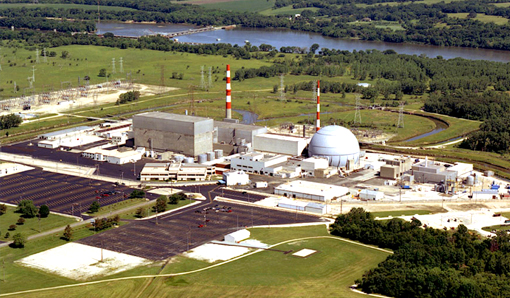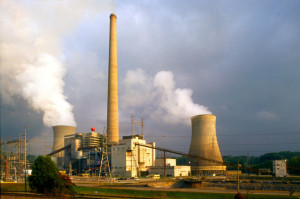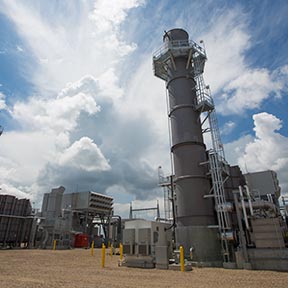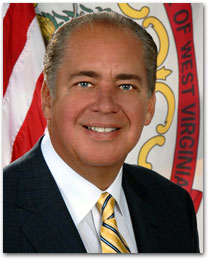Story on ComEd Contributions Spurs Call for Investigation

“The allegations in the Tribune article are serious and call for immediate action,” state Sen. Dan Duffy said in a letter to Attorney General Lisa Madigan. “ComEd should be required to disclose these contributions to ratepayers. At best, ComEd shareholders, not ratepayers, should bear the burden of funding these contributions.”
A 1987 law allows ComEd, the state’s largest utility, to pass on the cost of its charitable contributions to ratepayers. The Tribune article listed instances where some charities that received ComEd assistance were in the position to aid it.
More: Chicago Tribune
County Emergency Management Agency Uses Dresden’s Cooling Pond Water to Battle Ice

The Will County Emergency Management Agency has devised a system to siphon the 70 F water into the Kankakee River. “The warm water from Dresden’s pond helps break up the ice so it can flow freely downstream,” said Harold Damron, the agency’s director.
More: GenerationHub
INDIANA
Challenges to NIPSCO’s $1.1 Billion Modernization Plan Heard in Court
In a case before the state Court of Appeals, the Office of Utility Consumer Counselor and a group of industrial customers are challenging Northern Indiana Public Service Co.’s $1.1 billion electric modernization plan as too costly.
“These plans can cost ratepayers hundreds of millions, even billions, of dollars,” said Utility Consumer Counselor David Stippler. The Utility Regulatory Commission approved the plan in 2013, which would be funded by yearly rate increases that will total 4.9% by 2020.
A NIPSCO attorney said the improvements are necessary. “The commission determined the plan is beneficial to consumers, and no one has disputed that,” said Brian Paul. The court decision could affect improvement plans proposed by other state utilities.
More: The Times
KENTUCKY
Kentucky Power Appeals PSC Ruling on ‘Unreasonable’ Fuel Costs

The American Electric Power subsidiary says the commission disallowed charges associated with having both the Mitchell power plant and Big Sandy Unit 2 in operation simultaneously. Kentucky Power said it was necessary to run both units in Louisa to maintain system reliability and to meet demand, especially during last winter’s polar vortex.
Big Sandy Unit 2 is being retired later this year.
More: WOWK TV
MICHIGAN
City Upset That DTE Rate Hikes Would Kill LED Lighting Incentive

The utility said the old LED rate was experimental. “As we gained more experience with LED technology, we changed the pricing to reflect a more complete understanding of the costs associated with it,” said DTE spokesman Scott Simons.
More: MLive
University Report IDs Ways State Could Improve Fracking Oversight

The recommendations were included in a 277-page report compiled by scientists, lawyers and other University of Michigan faculty. “The purpose of the study is to pull together a massive amount of information and analyze the options in a way that is clear, so the state can look at these options and decide which if any they might want to adopt,” said Sara Gosman, one of the report’s authors.
More than 12,000 fracked wells have been drilled in Michigan since the late 1940s, but high-volume fracking of deep shale deposits is a new phenomenon. Michigan has 13 producing wells in the Utica-Collingwood shale formation, but drilling companies have leased hundreds of other sites.
More: PennEnergy
MISSISSIPPI
Mississippi Power’s CEO Warns Kemper Ruling Could Result in Rate Hikes of 35%

Holland, in a Sun Herald op-ed, said the court’s ruling effectively voids a plan the company and the Public Service Commission developed to keep down rate hikes associated with construction of the Kemper County integrated gasification combined-cycle plant. “If the court’s opinion stays in place and the refund is required, we will have little choice but to seek at least the original estimated amount of approximately 35% in rate increases,” he wrote.
The court threw out a PSC decision to allow $281 million in rate recovery for costs associated with the plant’s construction. The court said the PSC never found that the funds were “prudently incurred,” a requirement for recovery. Mississippi Power is challenging the court ruling.
More: Sun Herald
MISSOURI
PSC Approves Ameren’s Efficiency Plan Allowing 2013 Recovery Calculations
The Public Service Commission approved a settlement that determined Ameren Missouri’s energy efficiency programs saved 347 GWh in 2013. The amount will determine how much money the utility can recover from ratepayers.
Ameren had claimed that its program saved nearly 400 GWh. The Office of the Public Counsel estimated the savings at 300 GWh. They settled on 347 GWh.
More: St. Louis Today
NEBRASKA
2nd State Judge Signs Injunction Against Keystone XL Eminent Domain Actions
A York County District Court judge became the second state judge to grant an injunction halting TransCanada’s use of eminent domain to secure a route for its controversial $8 billion Keystone XL Pipeline.
The judge ruled in favor of a group of landowners who are challenging a state law that gave TransCanada eminent domain powers to build its crude-oil pipeline to Gulf Coast refineries and terminals.
“I know the war is not won yet, but it’s a start,” property owner Susan Dunavan said after the ruling.
More: Journal Star
NEW JERSEY
JCP&L Planning $267 Million on System Improvements; Rate Counsel Endorses $107 Million Rate Cut
Jersey Central Power & Light said it will spend $267 million on transmission and distribution improvements this year, including a new transmission line in Middlesex County.
Among the projects planned are nearly $6 million in distribution circuit upgrades, $24 million in tree trimming, and money for planning and constructing a 230-kV transmission line in Monmouth County.
JCP&L’s reliability record has been a recent target of regulators and consumers. The Division of Rate Counsel last month endorsed a decision by an administrative law judge that would force the company to cut rates by $107 million, saying that the utility’s reliability record is poor.
The Rate Counsel argued that the company had earned profits in excess of the amount allowed by the Board of Public Utilities. About 90% of its customers were left without power after Hurricane Sandy.
“JCP&L customers have suffered poor reliability too long and should be provided a remedy immediately,’’ the Rate Counsel argued.
More: JCP&L; NJ Spotlight
NORTH DAKOTA
Hearing Scheduled for New Power Plant near Williston

Basin Electric said the proposed expansion is needed to meet a forecasted 1,600-MW increase in load by 2035. The company wants to add 12 reciprocating gas-fired internal combustion engines generating up to 111 MW.
More: Grand Forks Herald
OHIO
PUCO Rejects AEP’s Guaranteed Income Plan for Coal Plants

While PUCO rejected the proposal, it ruled that the power purchase agreement was legal. That gave AEP a kernel upon which to press forward with a similar request for other plants. It has argued that customers would benefit from supply stability if the plants received a guaranteed rate. Critics say its proposal would represent a retreat from market-rate pricing.
“Further delays in deciding this issue will postpone our customers’ ability to take advantage of the financial benefits of what we proposed,” AEP Ohio President Pablo Vegas said in a statement. “We will work with the PUCO to address their outstanding issues with our problems.”
More: Columbus Business First
Rumors Surround Porter’s Move to PUCO, Johnson’s Tenure

Gov. John Kasich’s choice of Andre Porter, the state commerce director, to fill a vacancy on the Public Utilities Commission has sparked speculation that Chairman Tom Johnson’s reign may be ending.
Some observers wonder why Porter, who served previously on the commission, would want to make the move back to PUCO if he wasn’t angling for the chair. Johnson, who has been the commission’s chair for less than a year, has faced several controversial issues, including proposals to guarantee prices for merchant power and a legislative proposal to freeze the state’s renewable and energy efficiency standards.
The governor’s office did not comment on his plans for the commission.
More: Columbus Business First
PENNSYLVANIA
PUC Orders FirstEnergy’s Pa. Companies to Give More Details on Improvement Plan
The Public Utilities Commission ordered FirstEnergy’s four companies in the state — Met-Ed, Penelec, Penn Power and West Penn Power — to provide more details on how they intend to address issues raised in a PUC management audit.
The PUC’s Bureau of Audits identified 28 areas of improvement in the companies’ management practices that could produce one-time efficiency savings of $19.2 million and annual savings of up to $3.8 million. The PUC said FirstEnergy’s response was short on specifics and directed the company to devise a more detailed implementation plan.
“Because we have received similar responses to previous audit recommendations in the past with little meaningful improvement, it is imperative that FirstEnergy develop more robust responses to these recommendations,” Commissioner James H. Cawley said in a motion approved by the commission.
More: PUC
WEST VIRGINIA
Tomblin Vetoes Net Metering Bill, Solar Advocates Applaud

Solar advocates said the bill would have allowed utilities to raise costs for owners of solar installations, reducing incentives for renewable power.
“This bill was fatally flawed,” said Rhone Resch, president and CEO of the Solar Energy Industries Association. “Did it end up that way for political reasons? Or was it a case of sloppy drafting? Whichever the case, Gov. Tomblin did the right thing by vetoing the bill and sending it back to the drawing board.”
More: GreenTech Media
Compiled by Ted Caddell


